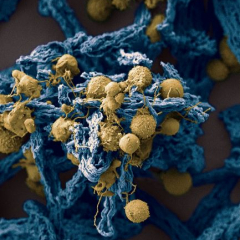Summary: Adoptive T cell therapy (ACT) has demonstrated dramatic therapeutic benefit in hematologic cancers. However, the identification and generation of cancer-specific T cells is laborious, the expansion rates and functionality of these T cell products are limited, and on-target and off-target side effects can carry substantial morbidity. New biomaterials can potentially overcome many current challenges related to T cell-mediated cancer immunotherapy.
We have recently developed a 3D system that mimics antigen-presenting cells (APCs). These biodegradable, APC-mimetic scaffolds (APC-ms) consist of a fluid lipid bilayer supported by mesoporous silica micro-rods (MSRs), enabling precise spatial and temporal presentation of membrane-bound and soluble cues for T cell activation. APC-ms enable robust antigen-specific expansion of rare cytotoxic T-cell subpopulations at a greater magnitude than autologous monocyte-derived dendritic cells, and in a xenograft lymphoma model, CD19 CAR- T cells expanded using APC-ms improved anti-tumor efficacy and overall survival, as compared to Dynabead-expanded cells. Importantly this “mix and match” APC-ms technology, makes it possible to simply combine various stimulatory, co-stimulatory and cytokine cues, and incorporate each in pre-defined compositions to enable unprecedented precision and accuracy in mimicking and modulating how APCs naturally signal to T cells. APC-ms can be configured to expand T cells of defined multi-epitope specificity, which would be expected to provide greater anti-tumor activity than cellular products of a single specificity, potentially limiting immune-escape mechanisms.
We now propose to develop this approach for both solid tumors and hematologic malignancies with the following aims:
1. Define optimal conditions for expanding rare tumor-specific human CD8 T cells while preserving high functionality. We will optimize the APC-ms system for human T cells specific for defined melanoma antigen MART1 to best support expansion of stem and central memory MART1-specific T cells.
2. Adapt the APC-ms system for generating polyclonal CD8 T cells expanded against multiple epitopes.
3. Utilize APC-ms to expand hematopoietically-restricted minor histocompatibility antigen (mHAg)-specific T cells from patients with AML.
Project Lead: Catherine Wu
Co-Investigators: David Mooney; Donna Neuberg; Jerome Ritz


